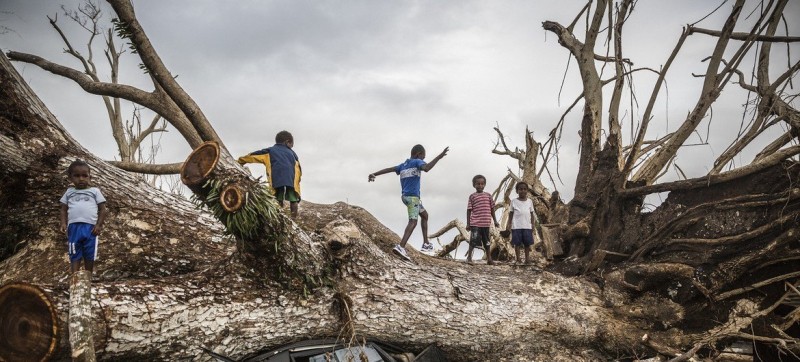UNICEF/Sokhin Climate change is a key driver of water stress, which occurs when more than 80 per cent of the water available for agriculture, industry and domestic use is withdrawn annually, as seen here in Port Vila, Vanuatu.
“We know more climate disasters are in the making. We just do not know where or when they will hit”, said Karin Hulshof, UNICEF Deputy Executive Director for Partnerships.”
The Today and Tomorrow initiative, for the first time, combines funding for immediate resilience and risk prevention programmes for children today, with risk transfer finance provided by the insurance market to help cope with future cyclones.
“The risks of climate change are no longer hypothetical. They are here. And even while we work to build communities’ resilience against climate disasters, we have to become much better in pre-empting risks for our children”, she added.
Invitation to help
Youth are a critically vulnerable population who are among the most affected by extreme weather events.
Last year, UNICEF’s Children’s Climate Risk Index estimated that 400 million children are currently at high exposure to cyclones.

© UNICEF/UN0496548/Andriananten Hammered by drought, a family collects rainwater in the south of Madagascar, where puddles are sometimes sourced for personal use or sale.
During the initial three-year pilot, the initiative will focus on Bangladesh, Comoros, Haiti, Fiji, Madagascar, Mozambique, Solomon Islands, and Vanuatu.
To move forward, UNICEF is raising $30 million for the project and calling for additional private and public partners to join the agency in closing the intensifying humanitarian financing gap for disaster protection for children and youth.
Partners in aid
Although extreme weather damage perpetuates and deepens inequality and poverty across generations, existing risk transfer mechanisms do not meet the specific needs of hundreds of millions of children and youth.
Today and Tomorrow is the first pre-arranged and event-based climate disaster risk financing mechanism that specifically targets the “child protection gap”, with full support for the future, as secured by the governments of Germany and the United Kingdom under the newly launched G7-V20 Global Shield against Climate Risks.
Heike Henn, a Director at the German Ministry for Economic Cooperation and Development, expects the initiative to deliver in the areas of knowledge-sharing and increased familiarity with risk financing instruments; improved shock resilience of development institutions; and help close the disaster risk protection gap, “especially for children and mothers”.
UK Minister for Development and Africa, Andrew Mitchell, strongly supports “bringing pre-arranged and trigger-based financing to the humanitarian sector…including this new grant to UNICEF…to protect up to 15 million children, young people and their families across Africa, the Caribbean, Asia and the Pacific and respond rapidly if tropical cyclones hit”.

© UNICEF/Ricardo Franco A child in in Beira, Mozambique, stands in rising water after the devastation of Cyclone Idai in 2019.
Triggering trouble
Cyclones and the disasters they spark, such as floods and landslides, are the fastest-growing category of climate-influenced disasters and a major cause of global losses and damages, according to UNICEF.
UNICEF’s research has shown that investments that reduce exposure to and negative impacts from cyclones and other hazards can considerably reduce overall climate risk for millions of children.
“UNICEF is the first UN institution, as well as one of the largest humanitarian organisations worldwide, to take out a bespoke disaster risk coverage for the protection of children, youth and parents, especially mothers”, said Simon Young, a Senior Director in the Climate and Resilience Hub at international insurance advisors WTW, which designed the insurance solution.
As well as pressing Governments and big businesses to rapidly reduce emissions, UNICEF urges leaders to take immediate action to protect children from climate devastation by adapting the critical social services they rely on.
UNICEF also urges parties to find and fund solutions to support those facing loss and damage beyond the limits to which communities can adapt.




Comments are closed, but trackbacks and pingbacks are open.